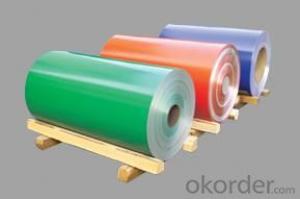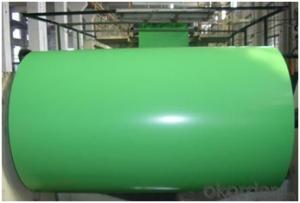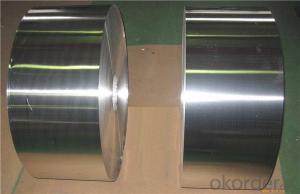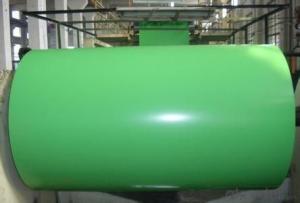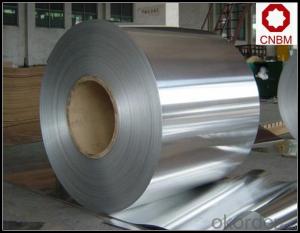Prepained aluminum coil for decoration
- Loading Port:
- China Main Port
- Payment Terms:
- TT OR LC
- Min Order Qty:
- -
- Supply Capability:
- -
OKorder Service Pledge
OKorder Financial Service
You Might Also Like
Aluminium is a relatively soft, durable, lightweight, ductileand malleablemetalwith appearance ranging from silvery to dull gray, depending on the surfaceroughness. It is nonmagnetic and does not easily ignite. A fresh film ofaluminium serves as a good reflector (approximately 92%) of visible lightand an excellent reflector (as much as 98%) of medium and far infraredradiation. The yield strength of pure aluminium is 7–11 MPa,while aluminium alloys have yield strengths ranging from200 MPa to 600 MPa. Aluminium has about one-third the densityand stiffness of steel. It is easily machined,cast, drawn and extruded.
Aluminium alloys (or aluminum alloys; see spellingdifferences) are alloysin which aluminium(Al) is the predominant metal. The typical alloying elements are copper, magnesium,manganese,silicon,tin and zinc. There are twoprincipal classifications, namely casting alloys and wrought alloys, both of which are furthersubdivided into the categories heat-treatableand non-heat-treatable. About 85% of aluminium is used for wrought products,for example rolled plate, foils and extrusions.Cast aluminium alloys yield cost-effective products due to the low meltingpoint, although they generally have lower tensile strengthsthan wrought alloys. The most important cast aluminium alloy system is Al–Si,where the high levels of silicon (4.0–13%) contribute to give good castingcharacteristics. Aluminium alloys are widely used in engineering structures andcomponents where light weight or corrosion resistance is required
Specification:
Alloy: AA1050, 1060, 1100,AA3003, 3005, 3015, 5052, 5754, 5083,8011, etc
Temper:H14/16/18/22/24/32, HO etc.
Thickness:0.2mm—100mm
Width: 100mm—2300mm (Can be slitted)
InnerDiameter: 508MM
Coil Weight:500kg-3000kg(Max.)
Application:Foil stock, Circles, Roofing, Can stock, Marine plate,Anti-slipery purpose in vehicles, packing and appliance.
Features:
1. Excellent quality of products
2. Quick delivery
3. Best service to clients
4. BV,SGS avalible
5. No buckle o waveness
6. Tension leveling
7. Certificate of Origin
8. Form A,E
Packaging Detail:
Carton ,Woodenpallet with plastic protection packing ,standard seaworthy packing or as yourrequest.
ProductionCapacity:
AnnualProduction capacity of 600,000 tons.
Products areexported to United States, Canada, U.A.E, Brazil, Mexico,Thailand, Vietnam,Nigeria etc, over 100 countries andregions all over the world.
Production Line:
CNBM aluminumproduction base is comprised of 18 aluminumannealers, 10 coil and foilmills, 4 continuous production lines, 2hot rolling production line and 3prepainted lines.
FAQ:
1. What is the form of payment?
Normally 30% TT, L/C
2. Type of quotation?
FOB, CFR, CIF
3. Port of loading?
Shanghai port
4. Delivery time?
30 day after client’s deposit
- Q:Can aluminum coils be used for HVAC ducting?
- Yes, aluminum coils can be used for HVAC ducting. Aluminum is a popular choice for ducting due to its lightweight nature, corrosion resistance, and ability to efficiently transfer heat. It is commonly used in both residential and commercial HVAC systems.
- Q:How many 1220mm*2440mm aluminum sheets can one-ton aluminum coil be sliced to? Thank you.
- If it is 1.0mm thick, the coil can be sliced into 124 pieces. For other thickness, please use 124 divide the thickness.
- Q:How are aluminum coils used in the production of HVAC components?
- Aluminum coils play a crucial role in the production of HVAC (Heating, Ventilation, and Air Conditioning) components. These coils are used in the heat transfer process of HVAC systems, where they assist in both heating and cooling applications. In HVAC systems, aluminum coils are typically employed in air conditioning units and heat pumps. They are an integral part of the refrigeration cycle, which allows for the transfer of heat from one area to another. The coils serve as the key component in the heat exchanger, responsible for absorbing heat from the indoor air during cooling or releasing heat into the indoor air during heating. The process starts with the refrigerant, a substance that circulates through the coils, absorbing and releasing heat. When the HVAC system is in cooling mode, the aluminum coils act as an evaporator. The warm air from the indoor space passes over the coils, and the refrigerant within the coils absorbs the heat, cooling down the air. This cooled air is then circulated back into the room, providing a comfortable environment. On the other hand, during heating mode, the aluminum coils operate as a condenser. The refrigerant, which has absorbed heat from the outside environment, passes through the coils. The cooler air from the indoor space flows over the coils, causing the refrigerant to release its heat. This heat is then distributed throughout the room, ensuring a warm and cozy atmosphere. The use of aluminum coils in HVAC systems offers several advantages. Aluminum is lightweight, which makes the HVAC units more portable and easier to install. Additionally, aluminum has excellent thermal conductivity, allowing for efficient heat transfer. This results in improved energy efficiency and reduced operating costs of the HVAC system. Moreover, aluminum coils are highly resistant to corrosion, ensuring their durability and longevity. They can withstand harsh environmental conditions, such as humidity and exposure to chemicals, without deteriorating. This makes aluminum coils a reliable and cost-effective choice for HVAC manufacturers. In conclusion, aluminum coils are essential components in the production of HVAC systems. They facilitate the heat transfer process, enabling efficient cooling and heating functions. With their lightweight nature, excellent thermal conductivity, and corrosion resistance, aluminum coils contribute to the overall performance, energy efficiency, and durability of HVAC units.
- Q:What are the different surface textures available for aluminum coils?
- There are several different surface textures available for aluminum coils, including smooth, brushed, embossed, and stucco. These textures provide varying levels of aesthetic appeal and functionality, allowing for customization and versatility in various applications.
- Q:Are aluminum coils suitable for gutter systems?
- Yes, aluminum coils are suitable for gutter systems. Aluminum is a popular choice for gutter material due to its durability, lightweight nature, and resistance to rust and corrosion. It is also easy to work with and can be customized to fit various gutter sizes and shapes.
- Q:What industries commonly use aluminum coils?
- Aluminum coils are commonly used in a variety of industries including automotive, aerospace, construction, HVAC (heating, ventilation, and air conditioning), electrical, packaging, and transportation.
- Q:Can aluminum coils be used in solar panel installations?
- Indeed, solar panel installations can make use of aluminum coils. The lightweight properties, corrosion resistance, and remarkable thermal conductivity of aluminum make it a favored material for constructing solar panels. Frequently, aluminum coils are employed as the supportive backing material for solar panels, ensuring both structural stability and effective heat dissipation. Additionally, these coils are commonly utilized in the production of solar mounting systems, which securely hold the panels in position. All in all, aluminum coils present a dependable and efficient choice for solar panel installations.
- Q:Are aluminum coils suitable for insulation jacketing?
- Yes, aluminum coils are suitable for insulation jacketing. Aluminum is a popular choice for jacketing material due to its excellent thermal properties, durability, and corrosion resistance. It is widely used in various industries, including HVAC, oil and gas, and petrochemical, for insulating pipe systems and equipment. Aluminum coils provide a protective covering around insulation materials, preventing moisture ingress and maintaining thermal efficiency. Additionally, their lightweight nature makes them easy to install and transport. Overall, aluminum coils are a reliable and effective solution for insulation jacketing applications.
- Q:Can aluminum coils be used in cryogenic applications?
- Yes, aluminum coils can be used in cryogenic applications. Aluminum is known for its excellent thermal conductivity, which makes it a suitable material for transferring heat in low-temperature environments. Additionally, aluminum has a low coefficient of thermal expansion, meaning it can withstand the extreme temperature changes that occur in cryogenic applications without experiencing significant dimensional changes. However, it is worth noting that aluminum coils may need to be specially designed or treated to ensure they can withstand the extremely low temperatures and avoid any potential issues such as brittleness or embrittlement.
- Q:I'm 14 an was told that aluminum free deodorant would stop yellow stains on my white shirts, so which female deodorant would help stop yellow stains
- Aluminum salts are used in antiperspirants. So, skip anything that claims to be an antiperspirant. (Some things that are antiperspirants are sold as deodorants, but not the other way around.) Right Guard Sport spray does not contain aluminum salts, and my T-shirts stayed white after I switched to it. Many people mistakenly think that it is the sweat that discolors the armpits.
1. Manufacturer Overview |
|
|---|---|
| Location | |
| Year Established | |
| Annual Output Value | |
| Main Markets | |
| Company Certifications | |
2. Manufacturer Certificates |
|
|---|---|
| a) Certification Name | |
| Range | |
| Reference | |
| Validity Period | |
3. Manufacturer Capability |
|
|---|---|
| a)Trade Capacity | |
| Nearest Port | |
| Export Percentage | |
| No.of Employees in Trade Department | |
| Language Spoken: | |
| b)Factory Information | |
| Factory Size: | |
| No. of Production Lines | |
| Contract Manufacturing | |
| Product Price Range | |
Send your message to us
Prepained aluminum coil for decoration
- Loading Port:
- China Main Port
- Payment Terms:
- TT OR LC
- Min Order Qty:
- -
- Supply Capability:
- -
OKorder Service Pledge
OKorder Financial Service
Similar products
New products
Hot products
Hot Searches
Related keywords

